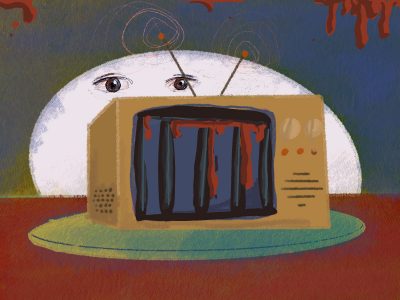For viewers of crime genres, these shows provide eerie, intense and thrilling feelings that are all too familiar.

With the assistance of streaming platforms, obsessively binge-viewing these series’ becomes extremely convenient. It’s this convenience that pulled me into the world of cable crime television, and keeping away has proved to be a challenge of its own.
As one of the many people in this day and age with an extremely short attention span, I had to turn away from the world of long-form storytelling shows. Shows with an ongoing plot, story arc and character development became a little too effortful. I needed something quicker, something that could cut straight to the chase. Cut out all that build up, I needed that entertainment ASAP. That’s where the good ole’ police procedural comes in.
Over the past nine months, I’ve been locked into the world of “Law and Order,” especially “Law and Order: Special Victims Unit.” The series takes on a new case each episode with a recurring cast of detectives, lawyers and judges. “SVU” is one of the many shows in the LAOCU (Law and Order Cinematic Universe) created by crime-genre mastermind, Dick Wolf.
The shows aren’t particularly television gold or as good as other award-winning shows on TV, but that doesn’t matter when it knows how to hook in viewers like me for hours of content.
These shows are captivating and provide an extremely stress-inducing hour of entertainment.
It’s reasons like these that keep viewers coming back for more — networks keep renewing seasons and new crime dramas are greenlit. “SVU” is currently in its 25th season, “Law & Order” was revived in 2022 after the series ended 12 years before and from 2019 to 2020, 19 crime shows aired across all broadcast networks. The genre’s popularity is undeniable.
I started watching “SVU” when I was attending the University of Massachusetts Amherst. I’ve never lived in Western Massachusetts before this, and I considered the area to be relatively safe.
Amherst kept me away from my hometown of Boston for the majority of the year, and away from the places I was familiar with. One thing that I thought no one could take from me was how comfortable I felt with the city.
Upon my return, I noticed that I started becoming more cautious in the areas I would frequent. Leaving to go out became overwhelming and, when I did go out, enjoying myself was nearly impossible. My anxiety ran in overdrive.
When I went into overcrowded train stations, my head would go to specific moments in the show where something happened in a New York City subway, a victim was caught off guard and attacked by a complete and random stranger. The idea that anyone –– even a stranger I didn’t know –– could catch me off guard felt too real.
I believed the city I was so comfortable in was actually a cesspool of danger and violence lingering everywhere I went.
I also started to feel guilty for acting like a stranger in my own home, and I knew I only had myself to blame. It felt like I was turning my back on Boston. I took pride in knowing it like the back of my hand — now it was feeling like I knew nothing about it at all.
It was only until the fall of this year where I realized that my crime-drama consumption and paranoia had something to do with each other and I knew I had an awful case of “mean world syndrome.” And these fears in conjunction with my heavy consumption of “SVU” were a part of the phenomenon.
The mean world syndrome is a cognitive bias where viewers start to see the world as more dangerous than it actually is. Overtime, moderate to heavy exposure of violence-related content leads to increased fears and anxieties about the world around us.
Even when real world crime seems to be at a decline, media shifts a viewer’s perception. The Annenberg Public Policy Center’s 2014 study found via FBI statistics that despite crime falling over five decades, both crime-related fears and violence portrayed on television increased.
It was good to acknowledge that I wasn’t alone in this shift in feeling, but I couldn’t help but feel a little embarrassed. I let a television show, a guilty-pleasure crime show of all things, get the better of my feelings.
And now here I was, scared, guilty and a stranger in my own home –– so, what now?
For one, I stopped watching “SVU” as much as I did. The amount of watch-time I was dedicating to the show was an issue. There was no other way to continue with the same amount of consumption while also trying to heal my perception of crime in Boston. To be fair, even this has proven to be challenging.
Boredom has become my enemy, it becomes easier to stop resisting from the show and watch an episode or two (or three). I was on the search for a more light-hearted show to fill up my time. I just started watching “Arrested Development” to take over those “SVU” binge viewing hours.
I also pushed myself to go out more. I couldn’t stay inside and not experience the city and expect to have this issue solve itself on its own. I had to see the city for myself, live in it the way I used to before, and realize that it isn’t as bad as how I was making it out to be.
This has been the most helpful for me. Getting “face-to-face” with the city was extremely healing. Slowly but surely, I was able to feel a bit more comfortable with the places I used to visit.
For viewers, it’s really important to know when it’s time to take a step back, and acknowledge when enough is enough. As entertaining as they are, nothing beats feeling comfortable at home.





















































































































